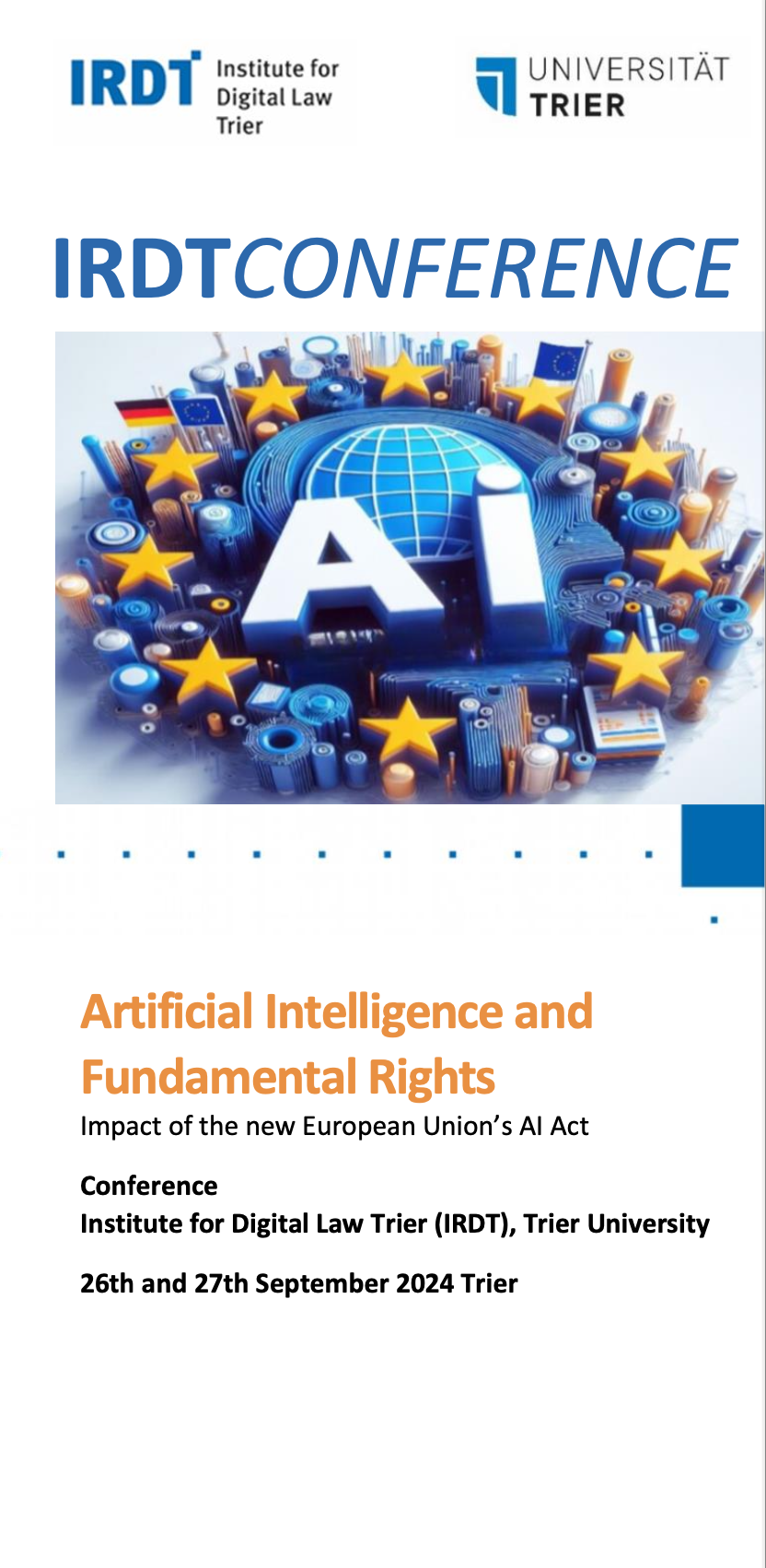
Artificial Intelligence applications often intersect profoundly with fundamental rights, shaping a landscape that demands legal understanding and technical insight. The AI Act aims to provide safeguards for fundamental rights while providing a legal framework that stimulates innovation. Our academic conference explores whether that delicate balancing has been successful.
We will approach the topic in four panels:
Panel 1: Technical Foundations of AI Regulation
The speaker will explore the intricate technical scope of the AI Regulation and its relevance to safeguarding fundamental rights.
Panel 2: Scope of the AI Act: Navigating Boundaries
The presentations will discuss the expansive scope of the EU’s AI Act and the regulation pyramid with the differentiated approach distinguishing between prohibited AI practices, high-risk AI systems and other AI applications, dissecting the respective reach and impact on fundamental rights.
Panel 3: Diligence Obligations: Upholding Ethical AI Practices
This panel will uncover the diligence obligations introduced by the AI Act and their pivotal role in preserving fundamental rights, especially data Governance, human oversight and the important role of self-assessment.
Panel 4: Global Perspectives on the EU AI Act
In the last panel, we will invite an international perspective outside of Europe, examining the AI Act’s implications on a global scale.
Our distinguished panellists, comprised of legal and technical experts as well as policymakers, will hope to inspire spirited discussions and debates, providing a comprehensive understanding of the complex interplay between AI and fundamental rights under the EU AI Act.
This conference serves as a premier platform for academics, legal practitioners, policymakers, and AI enthusiasts to converge, exchange ideas, and foster a first common understanding of the legal landscape surrounding AI and fundamental rights.
Programme
| Thursday, 26 September 2024 | |
| 2.00 pm | Welcome Prof. Dr. Antje von Ungern-Sternberg, IRDT Prof. Dr. Torsten Mattern, Vizepräsident Universität Trier |
| 2.30 pm – 4.30 pm |
I. Introduction and technical foundation The Making of the AI Act Irina Orssich (European Commission, DG Connect) Did the Legislature get it right? The Definition of AI Prof. Dr. Joanna Bryson (Hertie School) |
| 4.30 pm | Coffee Break |
| 5.00 pm – 7.00 pm |
II. Scope Prohibited AI Practices Dr. Patricia García Majado (University of Oviedo) High-risk AI Systems Prof. Dr. Tobias Mahler (University of Oslo) |
| Friday, 27 September 2024 | |
| 9.00 am – 10.00 am |
III. Diligence Obligations Data Governance Prof. Dr. Herbert Zech/Lea Ossmann-Magiera/Lisa Markschies (Humboldt-Universität Berlin) Coffee Break |
| 10.30 am – 11.30 am |
Human Oversight Dr. Tristan Radtke (TU München) Responsio: Isabella Banks (University of Amsterdam) |
| 11.30 am – 12.30 am |
Self-Assessment Assoc. Prof. David Restrepo Amariles (HEC Paris) |
| 1.00 pm – 3.00 pm |
IV. Brussel Effect? The outside perspective The US Perspective Prof. Dr. Margaret Hu, (William & Mary Law School) The Asian Perspektive Prof. Dr. Wang I-Ping (National Taipei University) The African Perspective Dr. Nomalanga Mashinini (University of the Witwatersrand) |
| 3.00 pm | Concluding Remarks |
Die Veranstaltung ist ausgebucht! Gerne setzen wir Sie auf unsere Warteliste, bitte kontaktieren Sie uns unter irdt@uni-trier.de unter Angabe der Veranstaltung.
The event is fully booked! We would be happy to put you on our waiting list. Please contact us at irdt@uni-trier.de, quoting the event.



